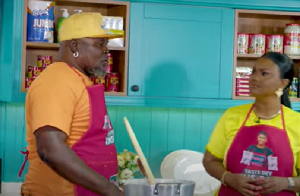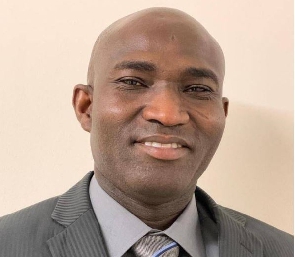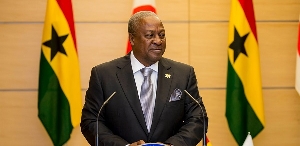...his motherland into regional economic power.
Osahene Kojo Boakye Djan, once the second in command to Flt Lt Rawlings during the heady and short lived Armed Forces Revolutionary Council?s rule in 1979, has laid down a grand plan to help rebuild his motherland.Osahene left the Ghanaian political scene soon after handing over to the elected civilian government (Peoples National Party) under the leadership of late President Hilla Liman in September 1979.
Although people have doubted the notion behind his quick exit after the handover in 1979, what cannot be disputed is the fact that Osahene kept to his promise to respect the constitution of the country. This is what makes his candidature more attractive to the supporters of his party (CPP) and intriguing to those of us who have been studying Ghanaian politics over the last 2 decades.
In an interview with this writer in London, Osahene Kojo Boakye Djan laid down his policies or action plan that he hope would help his country to achieve the necessary growth to alleviate and eventually eradicate poverty, as well as to prepare his country for eventual take off.
So far only 3 candidates have openly declared their intention to contest the 2008 presidential elections. They are Dr Arthur Kobina Kennedy, Dr Frimpong Boateng and Osahene Kojo Boakye Djan. Of these three only Arthur Ebo Kobina Kennedy and Kojo Boakye Djan have come out with concrete policy statements as to how they are to tackle poverty and corruption if given the opportunity by the Ghanaian electorates.
Thus coming out with detail policies, Osahene has taken the initiative from Arthur Ebo Kobina Kennedy of the New Patriotic Party. Osahene spoke candidly about the level of poverty and lack of opportunities in his homeland and his desire to use the markets to bring about social change and equality. Osahene accepted that those who work hard must be rewarded, thus in this regard researchers, innovators and entrepreneurs would be given the resources and support to flourish. However he explained that the poor and the less well off would be given help into employment and eventually onto the property ladder. Osahene said the Nkrumaists believe in the concept of the markets and gave the Chinese economic miracle as classic example of how the state and the private sector can work jointly for a common cause.
Osahene Kojo Boakye Djan said the Nkrumaists believe in property owning democracy as well, but also believe that policies should be put in place to afford everyone the opportunity to own their own home. Osahene said all their policies are fully costed and financing for most can be sourced locally. He said his government first policy is by making Bank of Ghana independent of government interference.
Osahene accepted the constraints on the government due to the huge external debt and the bottlenecks within the state sector that hinders development. He details areas that he wants his policies to have instant impact and how they would be funded.
On Defence:
Kojo Boakye Djan, a trained journalist before joining the Ghana Armed Forces as Officer Cadet and left at the rank of Major, acknowledges the impact on the economy of the huge defence budget. He explained that in order for the country to make progress the defence budget needs to be looked at. He stated that with renewed interest in the country?s out shore territorial waters (with regards to fishing, oil prospecting and pirates) and the urgency to safe guard the resources for posterity, it is imperative that spending on defence goes through rigorous scrutiny by the parliamentary defence committee. He said it is by using the parliamentary committees that spending can be measured in terms of delivery, accountability and transparency.
Osahene said the country?s Armed Forces and the Boarder Guards would be merged to provide value for money in their role of safeguarding the boarders of the nation. He said the Armed Forces would be prepared for emergency relief work within the country as well as their normal humanitarian work in the sub region and elsewhere. His knowledge on defence issues and how the country can use the services of the defence forces was quite amazing.
Osahene stated that since the country has got the potential to strike oil at the Keta basin and in the waters near Axim, it is important that the nation?s coastal waters are judiciously guarded. He said it is important that a division akin to the Royal Marines should be created (from a division of the Army and the Navy) to take up this important task. He also called for improvement of accommodation for the Armed Forces and the Police Service and modern equipment to prepared them for the task facing the nation in this era. He mentioned areas like cross boarder cooperation, internet crime, drugs and bank fraud that needs expect joint team of the security services.
Having detached himself from Ghanaian politics for over 20 years to study how other countries have managed to reformed their economies, Osahene comes into Ghanaian politics with a wealth of knowledge in policy development. With the level of support and following that Kojo Boakye Djan and Flt Lt Rawlings enjoyed among the junior ranks in the Ghana Armed Forces after June 4th, this son of Brong Ahafo, a soldiers? soldier and brilliant journalist decided to give democracy in his homeland a chance by staying away, and surely, he abide by this promise despite the provocations by the PNDC regime. (He never step foot in Ghana from 1979 to 2000).
On Education:
Osahene, who was a product of Dr Nkrumah?s Young Pioneer Movement, was very appreciative of the movement and the opportunity that Dr Nkrumah?s education policy gave to a whole generation of Ghanaian children. Of importance to him was the friendship, the urge to learn, the unity and the patriotism that the movement instilled in boys during hey days of the movement. He said Dr Nkrumah?s educational policies and the underpinning ideology of the Young Pioneer Movement was to encourage every Ghanaian child, irrespective of tribe or social status, to acquire knowledge and sense of duty to the nation, first and foremost. He said the same patriotism inspired him to join the army.
Osahene said those who argued after the overthrown of Dr Nkrumah that the Young Pioneer Movement members were brain washed are wrong. Osahene said generations of children from deprived backgrounds and from the rural areas became the first in their families to go to school. The charter of the Young Pioneer Movement states clearly that every member should be enrolled to go to school. Putting on the Pioneer scarf was the proudest moment in each boy?s life.
The sight of numerous children roaming aimlessly on the streets of the major metropolis ?Street Children? or ?Kobolo boys? (children who have no homes to go to and sleep on shop fronts at night) was a great worry to Osahene. At times choking on his words, and at times close to tears, Osahene Kojo Boakye Djan said these boys can and must be given the opportunities to learn skills in carpentry, house building, plumbing, auto mechanics, electricians and other vocational trade. This is one area that a close partnership between the Diaspora Community and the government must be encouraged. Osahene said the in migrations from the rural areas to the cities are some of the causes of the large congregation of these boys in the cities. They become vulnerable for exploitation and abuse by evil people. Osahene said by giving these boys the skills and tools their potential contribution to the economy can be huge.
Osahene said his educational policies would be based on the philosophy that underpinned Dr Nkrumah?s educational policy. He said 25% of the national income would be set aside for education. He said every Ghanaian child would be guaranteed of free Primary education irrespective of parental status. Of course those who can afford to send their children to private school can do so, that would be their own choice. He said every child would be given the basic skills to contribute their quota towards national development. Osahene said vocational training would ran alongside academic training. He promised the abolition of user fees in primary educational delivery.
Osahene explained that huge investment would go into science and technology. He said in addition to flag ship science and technology colleges (these are the present Government Secondary Technical Schools up and down the country), investment in science and Technology would be made in the nation?s four leading polytechnics ? Takoradi, Ho, Kumasi and Accra. He said accreditations would be given to the 4 polytechnics to award diplomas and degrees and post graduate degrees in technology and science based subjects. He said industries and other big enterprises/ business would be encouraged to collaborate with the research departments of these institutions. Osahene said the educational system would undergo drastic reforms to lead in the drive towards the Vision 2020 project. When reminded that the Vision 2020 project was set by his former friend and now bitter foe Flt Lt Rawlings, Osahene was guarded in his response. He said irrespective of differences he would not let ideological dogma hold him hostage to good policies that he thinks are in the interest of his country. He also mentioned gender equality and said his poverty eradication policy would place the girl/child exploitation issue firmly at the top of the policy. He acknowledged the importance of educating girls, and its benefit to the nation in the long term.
Osahene said the Volta Region deserves to have university. University of Agriculture which was in Dr Nkrumah?s grand plan could be sited at Ho. He explained that Ho Polytechnic would be upgraded into University of Agriculture and fully resourced to serve not only the Volta Region but the whole country. Osahene said the potential of the Volta region is such that establishing the University of Agriculture there would safeguard the nation?s food security. Osahene explained that Volta Region was very close to Osagyefo Dr Kwame Nkrumah?s heart and said Dr Nkrumah wanted to turn the Volta Region into a great tourist and agricultural region.
Osahene said all the state sector universities would be required to expand their education based courses (primary, secondary and further education departments) and thus funds would made available in that respect. He also mentioned teacher accommodations and transport in the rural areas and the regions. He mentioned amenities for those teachers and medical personnel who agree to relocate to the remotest areas. Underpinning these policies would be good transport infrastructure.
On Health:
Like education and defence, Osahene said all the regional hospitals must be upgraded. He particularly was disturbed at the deterioration of Effie Nkwanta (Sekondi), Tamale, Ho and Koforidua General Hospitals. With the shortage of medical personnel, he said the four mentioned hospitals would be turned into teaching hospitals. He also mentioned the Police Hospital and 37 Military Hospital as examples of lack of funding. He said 37 Military Hospital and the Police Hospital must be upgraded and given the resources to train doctors for the services.
Osahene promised to set up a committee to look at the pay structure for the medical staff. He mentioned giving them incentives, just like the teachers and lecturers, to serve in any part of the country that they are posted. Again he mentioned amenities and good accommodation for public service employees.
Osahene said huge investment and expenditure in will go hand in hand with the private sector. He said the government would pursue a prudent economic system based on Keynesian economics by economic stability based on sound job creation.
To be continued.




















